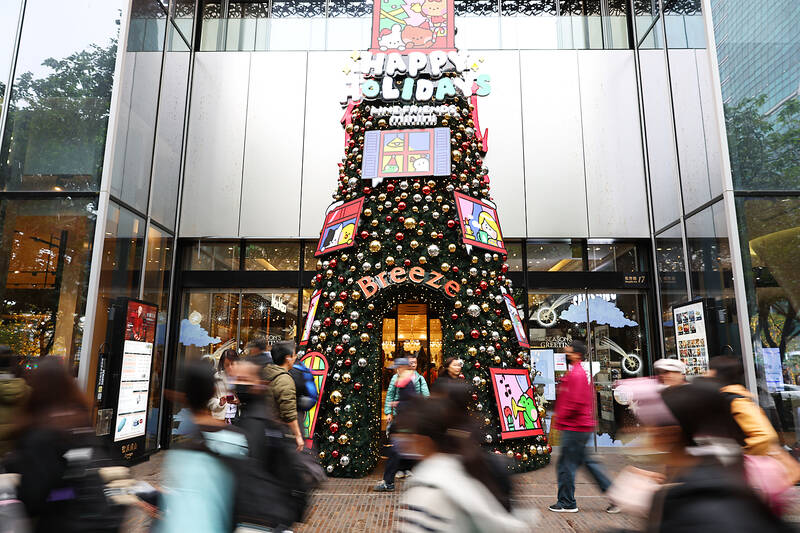Sales in the retail sector last month increased 1.8 percent from a year earlier to NT$438.1 billion (US$13.41 billion), a record high, reversing an annual decrease of 0.5 percent in the previous month, the Ministry of Economic Affairs said on Monday.
The ministry attributed the improvement in retail sales to the effects of anniversary sale events, the Double 11 Singles’ Day online shopping festival, store expansions, new product launches and special promotions associated with Taiwan’s victory in the World Baseball Softball Confederation’s Premier12 tournament.
They collectively led to annual increases of 6 percent in sales at convenience stores, 9.4 percent at supermarkets, 7.4 percent at hypermarkets, 3.1 percent at department stores, 5.2 percent at cosmetics outlets, 3.3 percent at household appliance stores and 2.1 percent at apparel shops, it said.

Photo: CNA
That helped offset a drop in sales at auto dealers, the ministry said, adding that sales of cars, motorcycles, auto parts and accessories decreased 4.1 percent last month.
Cumulative sales in the first 11 months of the year totaled NT$4.42 trillion, up 2.5 percent from a year earlier, marking the highest level for the same period on record, it said.
For this month, the ministry forecast retail sales to be NT$433.1 billion to NT$445.8 billion, representing growth of 2.9 percent to 5.9 percent on an annual basis.
It also forecast that retail sales for the whole of this year would increase by 2.6 percent to 2.8 percent to between NT$4.85 trillion and NT$4.86 trillion.
Meanwhile, sales in the food and beverage sector rose 7.2 percent year-on-year to NT$85.4 billion last month, compared with the 1.8 percent decline seen in the previous month, the ministry said.
The strong showing came as restaurants reported sales increased 7.6 percent and beverage stores’ sales grow 3.6 percent from a year earlier, after store operators launched special meals and promotions in conjunction with baseball games, while a drop in temperatures drove demand for warm food and beverages, the ministry said.
Steady demand for in-flight and group meals that resulted in a 9.7 percent sales increase in the catering business was also a factor behind the annual growth in food and beverage sales last month, it added.
In the first 11 months of the year, food and beverage sales rose 3.4 percent year-on-year to NT$941.2 billion, the highest ever for the same period, it said.
Sales this month are projected to climb 1 percent to 4 percent year-on-year to NT$92.8 billion to NT$95.6 billion, while the full-year sales are estimated to increase 3.2 percent to 3.5 percent to between NT$1.03 trillion and NT$1.04 trillion, it said.

When an apartment comes up for rent in Germany’s big cities, hundreds of prospective tenants often queue down the street to view it, but the acute shortage of affordable housing is getting scant attention ahead of today’s snap general election. “Housing is one of the main problems for people, but nobody talks about it, nobody takes it seriously,” said Andreas Ibel, president of Build Europe, an association representing housing developers. Migration and the sluggish economy top the list of voters’ concerns, but analysts say housing policy fails to break through as returns on investment take time to register, making the

‘SILVER LINING’: Although the news caused TSMC to fall on the local market, an analyst said that as tariffs are not set to go into effect until April, there is still time for negotiations US President Donald Trump on Tuesday said that he would likely impose tariffs on semiconductor, automobile and pharmaceutical imports of about 25 percent, with an announcement coming as soon as April 2 in a move that would represent a dramatic widening of the US leader’s trade war. “I probably will tell you that on April 2, but it’ll be in the neighborhood of 25 percent,” Trump told reporters at his Mar-a-Lago club when asked about his plan for auto tariffs. Asked about similar levies on pharmaceutical drugs and semiconductors, the president said that “it’ll be 25 percent and higher, and it’ll

CHIP BOOM: Revenue for the semiconductor industry is set to reach US$1 trillion by 2032, opening up opportunities for the chip pacakging and testing company, it said ASE Technology Holding Co (日月光投控), the world’s largest provider of outsourced semiconductor assembly and test (OSAT) services, yesterday launched a new advanced manufacturing facility in Penang, Malaysia, aiming to meet growing demand for emerging technologies such as generative artificial intelligence (AI) applications. The US$300 million facility is a critical step in expanding ASE’s global footprint, offering an alternative for customers from the US, Europe, Japan, South Korea and China to assemble and test chips outside of Taiwan amid efforts to diversify supply chains. The plant, the company’s fifth in Malaysia, is part of a strategic expansion plan that would more than triple

Taiwanese artificial intelligence (AI) server makers are expected to make major investments in Texas in May after US President Donald Trump’s first 100 days in office and amid his rising tariff threats, Taiwan Electrical and Electronic Manufacturers’ Association (TEEMA, 台灣電子電機公會) chairman Richard Lee (李詩欽) said yesterday. The association led a delegation of seven AI server manufacturers to Washington, as well as the US states of California, Texas and New Mexico, to discuss land and tax issues, as Taiwanese firms speed up their production plans in the US with many of them seeing Texas as their top option for investment, Lee said. The